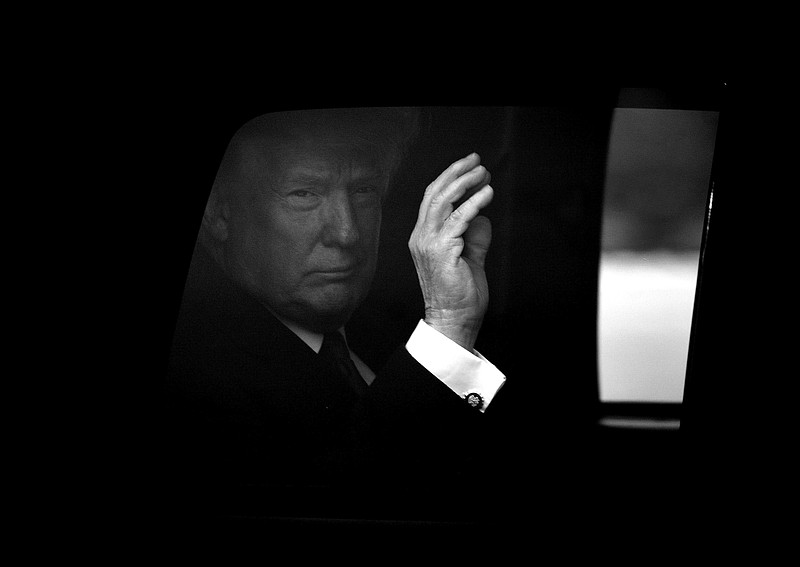One week ago today, lashing out at the picture drawn of his presidency in Michael Wolff's instant bestseller, "Fire and Fury: Inside the Trump White House," Donald Trump embarked on a campaign to show his competency.
It began with a new Trump branding effort.
"[T]hroughout my life, my two greatest assets have been mental stability and being, like, really smart," he tweeted. "I went from VERY successful businessman, to top T.V. Star to President of the United States (on my first try). I think that would qualify as not smart, but genius and a very stable genius at that!"
It was the beginning of a week of self-inflicted wounds confirming the basic premise in Wolff's book: that the president is "incapable of functioning in his job."
On Tuesday, Trump - looking to show he was on top of things - invited Republican and Democratic lawmakers to the White House for an on-camera meeting about immigration. Instead, the president briefly agreed to a Democratic plan for extending legislation to protect the Dreamers, forcing Republican leader Kevin McCarthy to cut in and remind him that his position was supposed to be quite the opposite. The meeting ended with Trump saying he would sign any immigration bill Congress put before him.
On Wednesday, he held his first news conference of the year, appearing with the Norwegian Prime Minister. Trump blathered on about the U.S. selling a plane to Norway that exists only in a popular video game, refusing to say whether he would agree to speak to Special Counsel Robert Mueller (something he said weeks ago he would certainly do); obsessing like it was still 2016 about his opponent Hillary Clinton; and incorrectly suggesting the U.S. does not use hydropower. (Don't tell TVA.)
Thursday was an even bigger day, starting with the president's public tweeting against the reauthorization of an intelligence bill his staff was lobbying to pass that day. Trump, it seems, was reacting to a "Fox and Friends" segment earlier that morning based on Trump's debunked claim that President Obama illegally surveilled him. Nearly two hours and a phone call from House Speaker Paul Ryan later, the president walked it back, saying, "We need it."
Later the same day, Trump spectacularly walked back his Tuesday pledge to sign any immigration deal Congress brought him.
With the rejection of that deal, he ranted at lawmakers, referring to African nations as (we won't repeat it verbatim in your morning paper) "s--hole countries" and asking shocked Congress members, "Why do we need more Haitians? Take them out [of the bill]."
So much for showing us presidential stability.
But why are we surprised? The real surprise would be if Trump suddenly did seem capable, truthful, compassionate, color-blind, unbiased, thoughtful - presidential.
Trump was not a pig in a poke that we had not seen before he was thrust upon us with the help of Russian hacking and an anachronism called the Electoral College.
Two federal discrimination judgments decades ago showed us that he had demonstrated racism in the 1970s by discouraging the rental of apartments to blacks and preferring white renters like "Jews and executives."
We knew he'd built his base for an eventual presidential run by appealing to other racists when he repeatedly and falsely claimed our first black president was born in Kenya, not Hawaii.
We heard him begin his candidacy with denigrating insults to Mexican immigrants, labeling them "rapists" and "criminals."
We saw him mark his presidency, in its first domestic tragedy, as a racist, after the Charlottesville, Va., alt-right riots. What other president in 2017 would call the white supremacists "fine people?" Especially after one of those "fine people" rammed his car into a crowd of counter protesters, killing a young woman and injuring others.
We saw him lie and bully and mock throughout the campaign and the first year of his presidency. He's done it again by denying that his "tough talk" on immigration didn't include vulgarity.
Sen. Dick Durbin, an Illinois Democrat and a key negotiator in the DACA deal meeting, on Friday publicly called out the president on that denial.
"He [the president] said, 'Haitians. Do we need more Haitians?' Then he went on and started to describe the immigration from Africa that was being protected in this bipartisan measure. That's when he used these vile and vulgar comments, calling the nations they come from 's--holes.' The exact word used by the president. Not just once, but repeatedly," Durban said.
Don't tell us Trump is a "stable genius" who's switching the headlines from whether he's crazy or growing senile to whether he's a racist.
And don't tell us he's just tough-talking and that love is what's really in his heart - as he suggested last week in his public meeting "studio" talk with lawmakers.
Neither his defenders nor his critics know what's in this president's heart (or his head, for that matter). Nor do we need to know.
All we need to assess the sad measure and deleterious impact of this president is what he says and does - over and over again. The same goes for any and every lawmaker - of any political stripe - who continues to cover for him.
